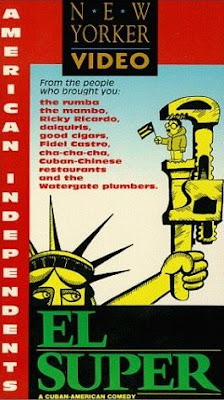
This screening at Trash Palace was a special event, not just because it was personally delivered (in the nick of time) from Montreal, but it's also the favourite movie of TP's snack bar attendant, Dan The Mouth. (As such, you would often hear lines being uttered before they hit the screen.) The Swimmer is a feature-length expansion of a short story by John Cheever, scripted by Eleanor Perry, who had written a lot of films for her husband, director Frank Perry, and is surely another unusual film in his canon (Last Summer, Doc, to name a few).
In this tale, set in Cheever's familiar New England suburbia, Burt Lancaster decides to journey home by taking a swim in everyone's pools on the way. As the odyssey progresses, things get darker, and Lancaster is forced to confront ugly truths about himself, right up to its bizarre ending. It's been years since I've read the short story, but I admire how the Perry's have fleshed this out to a full-length film, where we take the time to learn about the unhappy suburbanites along the way. The dialogue is full of ruse, bitterness and sexual longing. And the allegorical nature of the piece is enhanced by Frank Perry's psychedelic touches that give the movie a dream-like effect.
It's hard to imagine a film like this getting out the gate today without worrying the bankers who run Hollywood (especially the scene with the teenage girl). One assumes that back in its day, the casting of Burt Lancaster helped to get this picture made. One is reminded of how often the actor would take risks on screen with unusual roles or scripts customarily given a Hollywood star (Executive Action, anyone?) After the screen fades, and the viewer is left to sort out the ending, to paraphrase the promotional ad, when they talk about The Swimmer, they talk about themselves.




